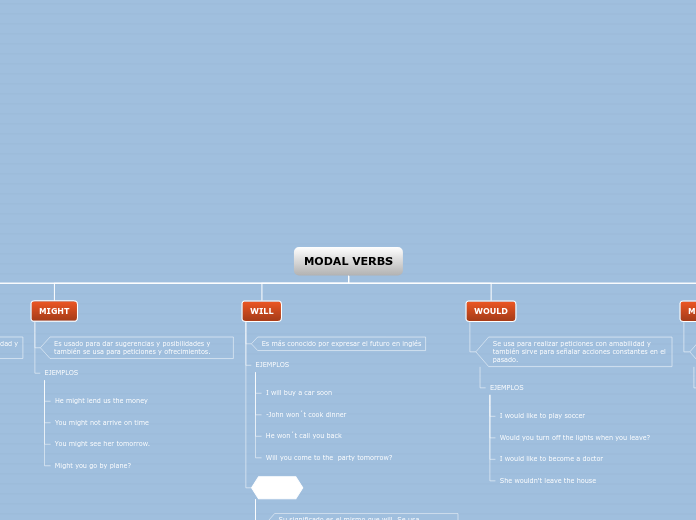
Expresa habilidad o posibilidad y en español los traducimos como “poder”.
EJEMPLOS
I can speak English
You can cook very well
She can't stay up all night.
Can you dance?
Este modal verb se utiliza para expresar posibilidad y probabilidad.
EJEMPLOS
They may not accept the offer.
He may not accept the job.
May I have another piece of cake?
I may cut my hair next week.
Es usado para dar sugerencias y posibilidades y también se usa para peticiones y ofrecimientos.
EJEMPLOS
He might lend us the money
You might not arrive on time
You might see her tomorrow.
Might you go by plane?
Es más conocido por expresar el futuro en inglés
EJEMPLOS
I will buy a car soon
-John won´t cook dinner
He won´t call you back
Will you come to the party tomorrow?
SHALL
Su significado es el mismo que will. Se usa principalmente con los pronombres personales ‘I’ (yo) y ‘we’
EJEMPLOS
I shall write to her.
Subtopic
Subtopic
Se usa para realizar peticiones con amabilidad y también sirve para señalar acciones constantes en el pasado.
EJEMPLOS
I would like to play soccer
Would you turn off the lights when you leave?
I would like to become a doctor
She wouldn't leave the house
En algunas ocasiones puede significar suposiciones, pero lo más común es que se refiera a necesidades o compromisos.
EJEMPLOS
He must be back by tomorrow
You must hurry up
I mustn't work tonight
Must you call her tomorrow?
Tiene la idea de una obligación o recomendación.
EJEMPLOS
You should speak to your friends about the trip.
I think you should buy a new car.
You shouldn’t visit me next weekend.
Should I work tonight?
She could go to the beach with us.
You could go home.
You could not call her tomorrow
Could he spend more time on his homework?